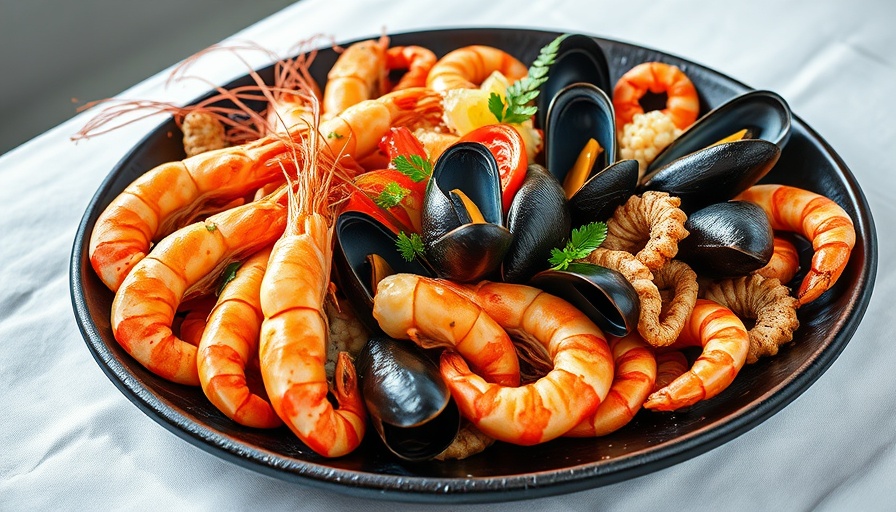
Explore Cape Town's Seafood Delights: A Culinary Adventure
When it comes to seafood dining, few places can compete with the vibrant culinary scene in Cape Town, South Africa. From traditional fish and chips to innovative dishes that showcase the region's rich marine biodiversity, the options are as diverse as the ocean itself. This city isn’t just about hearty meals but also the breathtaking views that accompany them, making each dining experience a memorable adventure.
1. Baía Seafood Restaurant: Elegance at the Waterfront
At the V&A Waterfront, Baía Seafood Restaurant stands out for its blend of sophistication and flavor. Known for its Portuguese-inspired dishes, diners can enjoy everything from fresh shellfish to perfectly grilled fish paired with an exceptional wine selection. The restaurant's terrace overlooking the harbor provides a perfect backdrop for an unforgettable meal.
2. Harbour House: Fresh Flavors with a View
Located in Kalk Bay, Harbour House is famous for its spectacular sea views and commitment to serving the freshest seafood available. With a menu that emphasizes local ingredients, this establishment is a must-visit for anyone looking to indulge in the tastes of the ocean, while also soaking in the charming coastal atmosphere of this fishing village.
3. The Roundhouse: History Meets Culinary Innovation
The Roundhouse in Camps Bay combines historic charm with modern culinary techniques. Having once served as a guardhouse, this restaurant now offers a menu that features seasonal seafood dishes crafted with care. Dine in beautifully restored quarters and enjoy the panoramic views of the Atlantic Ocean, creating a truly unique dining experience.
4. Willoughby & Co: More than Just Sushi
For sushi lovers, Willoughby & Co at the V&A Waterfront is a go-to destination. This restaurant is renowned for its variety of sushi rolls and sashimi, made fresh daily. The bustling atmosphere complements the culinary experience, making it a fun spot to enjoy your favorite seafood while in the heart of the city.
5. The Lobster Shack: A Casual Sea-Foodie Heaven
If you're after something a little more casual, The Lobster Shack offers a relaxed vibe perfect for grabbing a quick bite. Famous for its lobster rolls and seafood platters, this tucked-away gem captures the essence of beach dining without compromising on quality or flavor.
6. Fish On The Rocks: Authenticity by the Sea
Perched on the rocks in Hout Bay, Fish On The Rocks is an authentic fish-and-chip shop famous among locals and tourists alike. Enjoy the freshest catches of the day while appreciating the dramatic coastal scenery. As you savor each bite, you're experiencing a true taste of South African culture.
7. The Fish Market: A True Authentic Seafood Feast
Last but not least, The Fish Market offers a unique dining concept where you can select fresh seafood straight from the display. Known for its no-frills approach, diners can enjoy grilled or fried delights in a vibrant atmosphere. It's a favorite among locals and provides a real feel of Cape Town's strong seafood heritage.
Why Cape Town is a Top Seafood Destination
With its rich maritime history and access to some of the world's best fishing grounds, Cape Town has become a flagship destination for seafood in South Africa. The culinary scene reflects a blend of indigenous techniques and international influence, making it a captivating place for food lovers.
Planning Your Visit: Culinary Tour Tips
When planning your seafood tour in Cape Town, consider making a reservation at these restaurants, especially during peak seasons. Each establishment offers unique specialties, so mixing and matching your dining experiences can enrich your culinary adventure.
Final Thoughts on Cape Town's Culinary Charm
As you explore Cape Town’s seafood offerings, you engage not just with delicious food but also with the local culture and community connected to the ocean. Each meal tells a story and adds to the collective experience of the Mother City. So, pack your bags, grab your fork, and get ready to enjoy one of South Africa's most delicious coastal adventures!
If you're planning a trip to Cape Town, consider leveraging this list as part of your South Africa travel itinerary. You'll find that not all seafood dining experiences are created equal!
 Add Row
Add Row  Add
Add 




Write A Comment